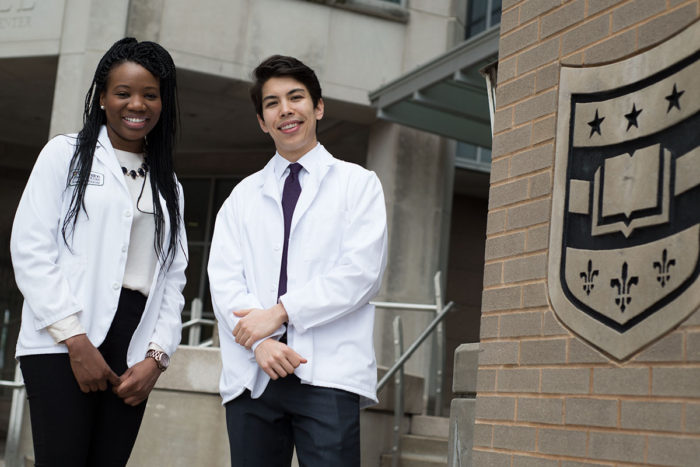Two medical students named Howard Hughes fellows
Prestigious award grants a year of mentored research
 Robert Boston
Robert BostonRukayat Taiwo and Connor Liu, medical students at Washington University School of Medicine in St. Louis, have been selected to receive mentored training with top biomedical scientists through the Howard Hughes Medical Institute’s (HHMI) Medical Research Fellows Program.
Two medical students at Washington University School of Medicine in St. Louis have been selected to receive mentored training with top biomedical scientists through the Howard Hughes Medical Institute’s (HHMI) Medical Research Fellows Program.
The program offers aspiring physicians and scientists $43,000 each in grant support, allowing students to spend a year conducting basic, transitional or applied biomedical research in the laboratory.
The School of Medicine’s recipients are Connor Liu and Rukayat Taiwo. Liu is one of 72 students awarded the fellowship for the first time, while Taiwo is one of seven fellows to receive funding for a second year.
“HHMI fellows represent some of the nation’s brightest physician-scientists in training,” said Koong-Nah Chung, PhD, the university’s associate dean for medical student research and director of the Office of Medical Student Research. “It is an extraordinary opportunity for them to focus on cutting-edge research that connects science and patient care. At the same time, they’re gaining professional exposure and personal perspectives that will guide them on their career paths.”
To apply, students submitted proposals and named current mentors.
Soon to be a third-year student at the School of Medicine, Liu’s research centers on testing computational strategies that may be used to design therapeutic cancer vaccines to treat malignant brain tumors.
“Ultimately, the research aims to better understand how the immune system recognizes cancer cells and use that understanding to harness patients’ own anti-tumor capabilities,” Liu said. “Our approach relies on genomic sequencing and analysis to identify high-priority protein targets on cancer cells. By testing these individual targets, we hope to understand the biological and genomic features that allow certain cancer proteins to go unnoticed while others may be detected by the immune system and thus have therapeutic potential.”
His mentor is Gavin P. Dunn, MD, PhD, an assistant professor of neurological surgery and of pathology and immunology.
“There has been a large resurgence in immunotherapy research in the last 10 years, and that work has shown promise in curing previously untreatable cancers,” Liu said. “There is also something satisfying about the narrative of unleashing our immune system’s inherent defenses to destroy a disease that has so far shown resistance to even the most potent chemotherapy regimes.”
Taiwo’s research focuses on analyzing the brain cancer glioblastoma on a molecular level. “Specifically, I am looking at a population of cells within the tumor that is responsible for therapy resistance and recurrence of this deadly cancer,” said Taiwo, who is in between her third and fourth years of medical school while she focuses on HHMI research. “I hope to bring to light additional molecular pathways that allow these cells to survive despite current medical therapies.”
Her mentors are Albert H. Kim, MD, PhD, an assistant professor of neurological surgery, of neurology and of developmental biology; and Joshua B. Rubin, MD, PhD, a professor of pediatrics and of neuroscience.
“I am glad to receive a second year of HHMI funding as it offers me the opportunity to further explore, and see to completion, a project that I am passionate about,” Taiwo said. “The skills I’ll garner from my research years as well as the connections I make will be instrumental to my success as a future surgeon-scientist.”
Altogether, the HHMI fellows represent 32 U.S. academic or nonprofit research institutions.
The HHMI fellows program is “an extraordinary opportunity for future physicians, veterinarians and dentists to explore the intersection of medicine and scientific discovery, and we hope that each student comes away further empowered to pursue a career as a physician-scientist,” said David J. Asai, the institute’s senior director of science education.
The HHMI program has funded more than 1,700 students since it began in 1989.







